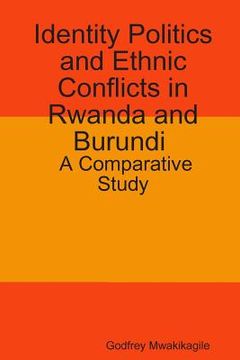Share
Identity Politics and Ethnic Conflicts in Rwanda and Burundi: A Comparative Study (in English)
Godfrey Mwakikagile
(Author)
·
New Africa Press
· Paperback
Identity Politics and Ethnic Conflicts in Rwanda and Burundi: A Comparative Study (in English) - Mwakikagile, Godfrey
$ 17.56
$ 21.95
You save: $ 4.39
Choose the list to add your product or create one New List
✓ Product added successfully to the Wishlist.
Go to My WishlistsIt will be shipped from our warehouse between
Monday, July 01 and
Tuesday, July 02.
You will receive it anywhere in United States between 1 and 3 business days after shipment.
Synopsis "Identity Politics and Ethnic Conflicts in Rwanda and Burundi: A Comparative Study (in English)"
This work looks at conflicts between the Hutu and the Tutsi in Rwanda and Burundi. The conflicts between the two groups have sometimes been characterised as ethnic, although neither group has fundamental attributes of ethnicity or ethnic identity which separate one from the other. They have the same culture. They speak the same language. And they have had a common history during the past 400 years. They have intermingled and have intermarried for so long since the Tutsi arrived in the region about 400 years ago that whatever differences existed between them in the past in terms of culture, identity, and biology have been erased. Yet they do exist as distinct social groups. They maintain separate group identities, as Hutus and as Tutsis, mainly because of the asymmetrical relationship between them. Inequity of power has solidified those identities. Historically, the Tutsi minority have been the rulers. Their status as the dominant group was enhanced during colonial rule when the Belgians favoured and recognised them as the traditional rulers, superior to the Hutu, thus legitimising inequalities between the two groups. The differences between them were even given official sanction. And the subordinate status of the Hutu majority was used by the Belgians to justify discrimination against them in terms of employment and educational opportunities while favouring the Tutsi. The conflict between the two groups is rooted in inequity of power, fuelled by stereotypes against the Hutu majority. Domination of the Hutu majority by the Tutsi minority, which started before the advent of colonial rule, has also solidified ethnic identities of the two groups through the years. A shared consciousness among the members of each group and their distinctiveness - each seeing themselves as different from the other - have also played a major role in the evolution and consolidation of these separate identities.
- 0% (0)
- 0% (0)
- 0% (0)
- 0% (0)
- 0% (0)
All books in our catalog are Original.
The book is written in English.
The binding of this edition is Paperback.
✓ Producto agregado correctamente al carro, Ir a Pagar.

